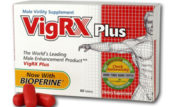 You might say it’s the most powerful force on the planet. No, it’s not gossip – that’s the one thing that travels faster than the speed of light – we’re talking about man’s desire to have sex. No erection, no life. Pretty simple and ruthlessly accurate.
You might say it’s the most powerful force on the planet. No, it’s not gossip – that’s the one thing that travels faster than the speed of light – we’re talking about man’s desire to have sex. No erection, no life. Pretty simple and ruthlessly accurate.
The good news is that there’s no reason why men can’t have sex right up ’til a ripe old age. A man can father a child well into his nineties, in fact, unlike the relatively short reproduction years that women experience.
Now, the bad news. Men may want to have sex, but it’s not always possible. Erectile dysfunction affects between 12 and 25% of men at 65, and a whopping 70% just five years later.
Cast aside jokes of ‘suffering in silence’ – ED is a serious issue that can lower quality of life and make you feel like you’re not quite all there. Worse, a study published just last month reveals that ED often predicts risk of more serious health concerns down the road, including heart disease, heart failure and a slight case of death.
Don’t ignore ED – deal with it, with a visit to your doctor and appropriate treatment. Better yet, reduce your risk of this common health issue with intervention, understanding, and ideally prevention, with some of the lifestyle factors we’ll discuss in this article.
ED Linked to Heart Disease
You might call it Early Diagnosis; in a recently published Australian study, researchers found that even mild erectile dysfunction is often indicative of heart disease and increased risk of death.
That risk went up according to the severity of ED symptoms. Men age 45 and older without diagnosed cardiovascular problems were 50% more likely to be hospitalized for heart-related issues.
Risk increased further still if the man had a history of heart disease.
The researchers conducted the study to further explore the link between ED and cardiovascular disease. Consisting of more than 95,000 men at least 45 years of age, study lead author Dr. Emily Banks and her team compared data collected between 2006-2009 and further data from 2010.
The team adjusted statistics to weigh socio-economic and lifestyle factors, including smoking and high alcohol consumption, so the results wouldn’t be swayed by high numbers of men in any given demographic.
Men with severe erectile dysfunction were eight times more likely to have heart failure, 60% more likely to have heart disease and double the risk of death as men without erectile dysfunction.
Among their findings? Men with severe erectile dysfunction were eight times more likely to have heart failure, 60% more likely to have heart disease and double the risk of death as men without erectile dysfunction.
The study falls shy of proof that erectile issues will lead to heart problems in the future. Some men experienced ED symptoms yet demonstrated no cardiovascular problems.
But there’s a definitive link between the two, as the study demonstrates, and considering that some symptoms of heart disease are not noticeable – and that it’s also the leading cause of death in the United States, there’s a clear message here: get ED checked out by your physician, no matter how trivial it may seem.
 And get your heart checked while you’re at it.
And get your heart checked while you’re at it.
About Erectile Dysfunction
Sometimes called “impotence”, erectile dysfunction is the inability to achieve and sustain an erection suitable for sexual intercourse; it’s different than other sexual problems that sometimes creep up with age, including low libido and premature ejaculation.
According to the National Institutes of Health, about 5% of 40 year old men live with ED on an ongoing basis. Consider that an erection requires:
- the nerves in the penis to properly function
- adequate blood circulation
- blood retention in the corpora cavernosum
- stimuli from the brain
Anything that interferes with this process will prevent an erection.
Though it’s not uncommon to have erection difficulties sporadically, as a general guideline, you’re flirting with erectile dysfunction if this occurs more than 50% of the time.
The link between ED and heart disease remains unclear. Some speculate that the arteries of the penis are smaller than those in the rest of the body and act as a litmus test for further, more urgent cardiovascular problems in the future.
In any event, studies show there’s a clear link between the two. And given that heart problems are very common, it’s a warning sign to take seriously, understand, and when possible, prevent.
What Causes ED?
ED occurs for a variety of reasons. Some are within your control, some are not. ED triggers that fall in the former category include:
Smoking – The health concerns from smoking keep piling up. Smoking hardens the arteries in a process called atherosclerosis, which reduces blood flow throughout the body and makes it more difficult to get an erection.
Obesity – A high body mass index (BMI) increases risk of leakage from the blood vessels. Called vascular disease, it’s a common ED trigger.
The Couch Potato Lifestyle – A new study suggests that men who watch a lot of TV have a lower sperm count. According to the American Urological Association, they go limp a lot too.
Unmanaged Diabetes – Diabetes affects blood flow to the penis and the nerves involved in the erection process. You need to manage diabetes with regular exercise and healthy diet, or it will manage you.
High Cholesterol – On a related note, high cholesterol can damage the lining of the blood vessels in your penis and restrict essential blood flow through the arteries to your ticker.
 High Alcohol Consumption – Excessive alcohol consumption – that’s more than two drinks a day for men – can reduce blood flow and impact your production of testosterone. That’s a double-hit to your penis.
High Alcohol Consumption – Excessive alcohol consumption – that’s more than two drinks a day for men – can reduce blood flow and impact your production of testosterone. That’s a double-hit to your penis.
Illegal Drug Use – Yes, we’re officially taking the fun out of life, but hard drugs like cocaine and even marijuana can restrict blood flow and otherwise make things difficult for your friend to get hard.
Stress – Stress and anxiety are some of the most common triggers of ED. Of course, the latter just further fuels the fire and can led to performance anxiety. Can’t a guy ever catch a break?
Nine Ways to Reduce Your Risk of ED
Admittedly it’ll take work. But you can reduce your risk of ED with some basic changes to your diet and lifestyle.
You’ve heard many of these tips before. And yet there’s a reason for that: healthy lifestyle means a healthy organ. You’ll live longer, and better. As a bonus, you’ll get more sex out of the equation.
Eat Dark Berries – The term “superfood” get thrown around plenty in health circles. Yet the benefits of dark berries, including blue and black berries can’t be ignored. The reason? Antioxidants, and in particular, erection-friendly nutrients called anthocyanins, which protect an essential chemical called nitric oxide that dilates the blood vessels that permit your you-know-what to get happy.
Stop Smoking – This nastiest of habits not only raises risk of heart disease, it also damages the arteries and doubles risk of ED. But it’s not a complete train wreck – men who quit in their fifties or earlier can usually reverse the damage. Just one smoke-free day, in fact, can increase erection frequency by 40%.
To take this a step further, put some fish on your plate. Scientists at the Royal College of Surgeons in Ireland found that an amino acid in fish, called taurine, helped arteries heal from smoking damage.
64% of men who pursued acupuncture got their mojo back and required no further treatment.
Use Your (Five) Senses – High stress levels stimulate the body to release epinephrine. That’s a kind of adrenaline that hardens the blood vessels and triggers all sorts of unpleasantries, with ED not far behind. A solution? Focus on your senses several minutes each day. That may be the smell of your morning coffee or the sound of rain pelting against your car. Whatever it might be, embrace it – and feel your stress go down.
Quit Snoring (Please!) – Risk of heart disease shows in unflattering ways. Snoring’s among them: men who saw wood in their slumber divert much-needed oxygen from their penile tissue. Reduce snoring with gravity. Put bricks under your bedposts at the head of the bed. This elevates your torso without bending your neck, changing the effect of gravity on your throat. And perhaps giving your partner a better night’s sleep!
Try Dark Chocolate – Here’s one vice you can safely pursue. Dark chocolate contains flavanoids called epicatechins, which release chemicals that dilate the inner layer of your arteries. A study conducted at the University of California at San Francisco found that munching a 1.6 ounce dark chocolate bar each day increased blood vessel-dilation by 10%.
Watch Your Estrogen Levels – First, the bad news. Men with a body mass index (BMI) over 25 may have more difficulties getting hard, in part because heavier men convert testosterone to estrogen. Now the good news: a study published in the Journal of the American Medical Association found that clinically obese men had less ED when they lost just 10% of their body weight.
Consider Acupuncture – Peruse the International Journal of Impotence Research and you’ll find mention of acupuncture as a way to treat psychologically caused erectile dysfunction. Sound more like ancient folklore than a respectable treatment? Consider this: 64% of men who pursued acupuncture got their mojo back and required no further treatment.
 Do Kegels – A British study reveals that of 55 impotent men who performed kegels daily for six months, 40% of them regained sexual function. To perform a kegel, contract and relax your pelvic muscles while sitting, though you can also do this while lying down. Do this up to 18 time daily and hold each one for 10 seconds.
Do Kegels – A British study reveals that of 55 impotent men who performed kegels daily for six months, 40% of them regained sexual function. To perform a kegel, contract and relax your pelvic muscles while sitting, though you can also do this while lying down. Do this up to 18 time daily and hold each one for 10 seconds.
Review Your Medications – Some prescription medications are linked to ED, a popular one being cholesterol pill simvastatin (sold as Zocor). Go to MensHealth.com/Drug for a list of common offenders. Speak with your doctor for more information, as it may be possible to find another medication without destroying your vibrant sex life.




